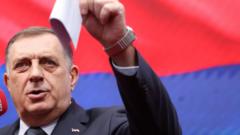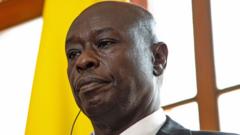In a poignant reminder of the past, the stage of Sarajevo's War Theatre echoed sentiments of grief and unresolved trauma as the world premiere of "Flowers of Srebrenica" brought the atrocities of July 1995 into sharp focus. The play captures the horrors of the Srebrenica massacre, where Bosnian Serb forces systematically executed over 8,000 Bosniak men and boys, despite their hopes of safety under UN protection.
The massacre, recognized as Europe's most notorious war crime since World War II, unfolded when Bosnian-Serb General Ratko Mladić led his troops to overrun the UN-designated safe zone. The subsequent violence saw the forced transportation of women and children, culminating in the brutal slayings of mostly men and boys. As bodies were buried in mass graves, covering up their crimes only compounded the suffering of victims' families, many of whom are engaged in a relentless quest for closure. DNA testing has allowed some families to finally give their loved ones a proper burial at Potočari Cemetery.
In contemporary Bosnia, sentiments remain fraught as a stark divide between the country's entities persists. While Sarajevo's citizens gather to pay respect to the victims, leaders in the majority-Serb Republika Srpska continue to refute the classification of the massacre as genocide, despite international tribunal convictions validating the victims' plight. Selma Alispahić, a lead actress and former refugee, asserts the frustration felt by many, remarking on the weariness of reliving historical truths that have already been legally established.
The Dayton Peace Agreement, intended to halt the bloodshed, has inadvertently institutionalized ethnic divisions, assigning different groups to separate entities. Political tensions have resurfaced recently, with Dodik's efforts to withdraw from national institutions prompting conflict with the international community. Christian Schmidt, the High Representative for Bosnia, warns against the destabilizing effects of such actions and calls for a reinforced international presence to ensure peace.
As memorials for Srebrenica unfold, stark contrasts in recollection are evident. While the commemoration draws throngs of supporters under the rain in Sarajevo, visible recognition is sparse in East Sarajevo, revealing the continued rift between communities. Public officials from Republika Srpska dismiss the remembrance as divisive, arguing for recognition of suffering on all sides, a stance met with anger and sorrow by those directly affected by the massacre.
With new generations encountering the same oppressive atmosphere as their predecessors, the call for solidarity grows louder. Events rallying support for the Srebrenica victims, like those organized by cyclists and runners, symbolize a shared commitment to healing in contrast to political maneuvering that threatens to further deepen division. As citizens wrestle with their past, the sense of insecurity looms large—leaving many, like Mirela Osmanović, fearful for the safety and future of their community amidst rising political tensions.









